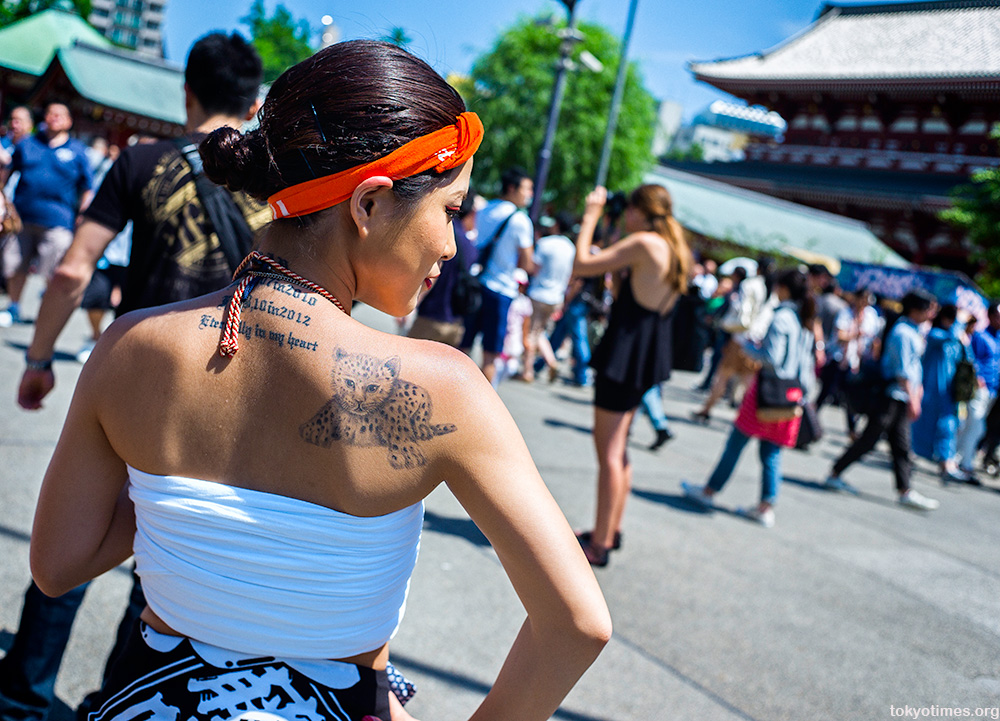Traditional Japanese tattoos and their artists may well be revered in many other parts of the world, but that’s generally not the case in Japan itself — the association with organised crime turning many against them. Yet at the same time, no distinction at all is made between such obvious forms of body art, and the modern, far more fashion-based variations that are so prevalent in other regions. The likes of spas, sports clubs and swimming pools still operate blanket bans, and Osaka’s right-wing governor, Toru Hashimoto, even tried to have public employees with tattoos removed. And if not the person, then at least their tattoo.
However, while institutions and a large chunk of the population remain stuck in the past, attitudes among younger Japanese are gradually changing. Over the last few years in particular, more and more tattoos have become visible — sported by both male and female alike. The vast majority of whom aren’t in any way shy of showing them off.

Martin says
Cute tattoo. Looks like it might be some kind of memorial.
Lee says
That’s what I thought when I tried to read it when I got home. Wish I’d asked at the time to be honest, but I didn’t think…
Hans ter Horst says
Onsen, swimming pools, etc. are still so difficult for people with tattoos, even the tattoos that are clearly not yakuza related, the stigma runs deep in society and, if you would ask me, it goes way beyond keeping the yakuza out.
Lee says
Quite possibly. It’s an issue I myself have had to deal with — several times. But how to solve it, I don’t know…
Spoke to my in-laws about it, and they felt there was a clear, obvious distinction. But I’ve talked to countless others (who in many other ways were very liberal) and they were totally against any kind of tattoos. The yakuza were mentioned, but like you say, it probably goes beyond that. And yet it’s part of the culture. A part that for me at least should be celebrated, not demonised.
Bernadette Marchetti says
I’ve heard of this blanket ban on tattoos before. The problem I have with such a ban is that tattoos aren’t always for aesthetic reasons. Cancer patients (or rather, patients who get radiotherapy) often are given tattoos to help the radiotherapist pinpoint specific areas to irradiate. Also, some people have tattoos to indicate some sort of health information like a chronic illness or allergy in case the person loses consciousness. it’s also done in some militaries. They tattoo relevant personal information instead of relying on dog tags. Then, of course, there are Holocaust survivors. I wonder if the blanket ban applies to these people as well. I really can’t imagine someone telling a Holocaust survivor that he or she can’t go in to an onsen because of his or her tattoo.
Lee says
Interesting. I hadn’t even thought about possible situations like that. But, with Japan being a land where rules are strictly adhered to no matter how daft they may be, they’d probably be turned away…
LAObserver says
It is interesting to see another Asian female with an English text tattoo on her skin. Kim Hyan Ah is another. Why not their native tongue, is the question this poses.
Lee says
Good question. Fashion? Arguably similar to all the kanji tattoos in the west I guess.
Squidpuppy says
Looks like she misses her koneko. Although it doesn’t appear to have been a domestic kitten. Only two years… maybe it was taken away from her. Not sure it’s legal to keep “wild” cats as pets in Japan. One of the native yama neko? Wonder if she’s from Okinawa, or the islands. It doesn’t look like an Iriomote Neko.
Lee says
Her mate said it was a tiger. So presumably not a pet. But then there are the dates… Unless, of course, they are total unrelated. Quite the mystery.
stev says
Where was this shot taken? Is she just an every day japanese girl or some actress/celebrity? Are there any more pictures?